New Computer Science Certification Helps Illinois High School Teachers, Students Level Up
by Aaron Seidlitz, Illinois CS / Mar 25, 2021
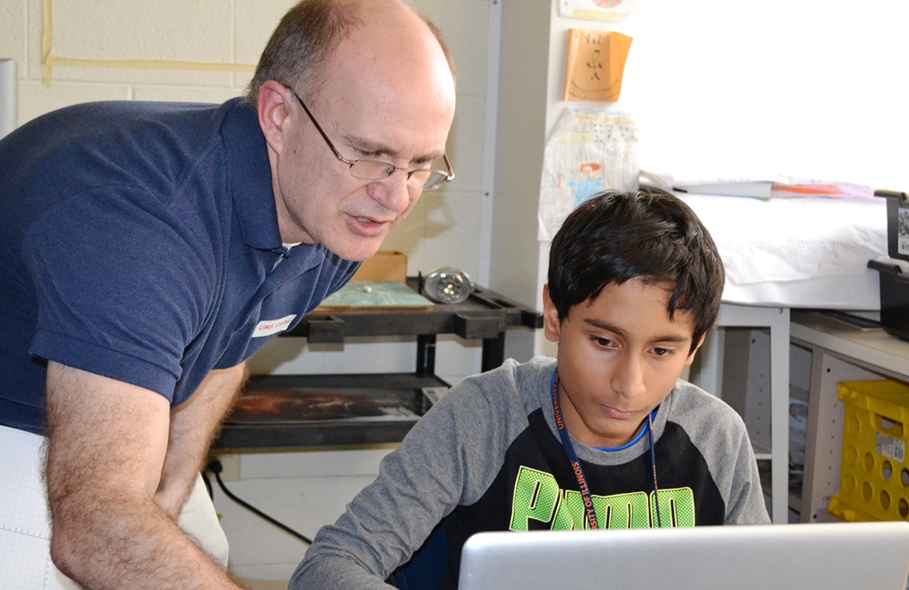
Adam Poetzel, instructor in Curriculum & Instruction, helps an Urbana Middle School student tweak computer code.
Education's Luc Paquette, Raya Hegeman-Davis, and others have been working with the Department of Computer Science's Craig Zilles and CS Ph.D. students to pave the way toward a more equitable high school computer science experience in Illinois.
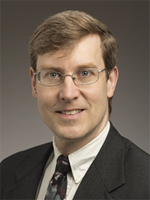 Over the course of his career with Illinois CS, associate professor Craig Zilles became decorated for his efforts teaching undergraduate students. Now, he’s found a new outlet for his passion to teach computer science.
Over the course of his career with Illinois CS, associate professor Craig Zilles became decorated for his efforts teaching undergraduate students. Now, he’s found a new outlet for his passion to teach computer science.
In the classroom, Zilles’ inspiration comes not only by teaching computer science but by learning as much as possible about teaching it well.
Two years ago, a new project began pushing that effort out to a much larger group of teachers. In collaboration with colleagues from the College of Education, Zilles and the interdisciplinary team began designing a program that will offer a Teaching Endorsement in Computer Science to high school teachers. That certification is nearly ready to launch—and none too soon, since an education bill requiring Illinois high schools to provide opportunities for students to take at least one CS course was recently signed into law by Governor J.B. Pritzker.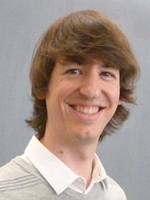 Officially launching in summer 2021, applications open April 26 for the five-semester computer science endorsement track—currently, the only certification program available for teachers in Illinois. Teachers enrolled in the program will attend class remotely with instructors from the University of Illinois Urbana-Champaign.
Officially launching in summer 2021, applications open April 26 for the five-semester computer science endorsement track—currently, the only certification program available for teachers in Illinois. Teachers enrolled in the program will attend class remotely with instructors from the University of Illinois Urbana-Champaign.
“This effort started in the College of Education, but I have had a similar thought in the back of mind for some time now. What makes a program like this relevant is the great interest in teaching computer science skills at the high school level. Currently the workforce can’t match that interest, though,” Zilles said. “Thanks to people like (assistant professor) Luc Paquette and (research coordinator) Raya Hegeman-Davis in Education, we have an opportunity ahead to provide a solution.”
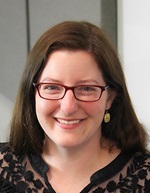 Zilles worked closely with Paquette to develop learning objectives and a high-level structure of the program. Then Paquette and Hegeman-Davis formed a group of Ph.D. students in the Department of Computer Science to help build out the course structure and content.
Zilles worked closely with Paquette to develop learning objectives and a high-level structure of the program. Then Paquette and Hegeman-Davis formed a group of Ph.D. students in the Department of Computer Science to help build out the course structure and content.
CS Ph.D. Students Design Flexible, Engaging Curriculum
Now in his second year as a Ph.D. candidate at Illinois CS, Max Fowler began contributing after choosing Zilles as his adviser and serving with him as a teaching assistant in the Introduction to Computing-Non-technical (CS 105) course.
Fowler is one of three CS doctoral students building out course content for this program. The other two students are Tanvi Bajpai and Morgan Fong. Fowler said his involvement stemmed from an early discussion with Paquette, who he told of his prior work in academia at Purdue University Fort Wayne.
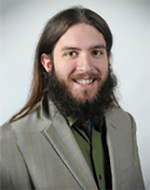 While there as a continuing lecturer, and prior to joining the Illinois CS Ph.D. program, Fowler said he tried to design a similar program in the state of Indiana.
While there as a continuing lecturer, and prior to joining the Illinois CS Ph.D. program, Fowler said he tried to design a similar program in the state of Indiana.
It didn’t earn funding, but the experience motivated Fowler to make an impact in education by earning his doctorate in computer science.
“Hearing of this opportunity at Illinois CS from Craig and Luc proved to me that I was at the right place at the right time,” Fowler said. “I remember, Luc asked me if this would be something I was interested in, because he felt like it seemed a good fit based off my previous experience. Of course, he was right.
“I’m excited because we can help high school teachers learn from their own trials and successes in learning computer science. They can then more effectively convey the lessons they learned to their own students.”
Addressing Secondary Education Disparities in CS
As this group designed the program, further inspiration for the secondary certification presented.
Zilles said that income disparity can cause dissimilar computer science offerings in high school. Simply put, the richer the school district, the more opportunity for students to learn these skills before college.
At Illinois, all students are welcome to apply to an undergraduate CS major, regardless of their high school experience. And while the undergraduate program is designed so students can succeed with any background, students without programming experience can become discouraged if they see other students not having to work as hard – unaware that those other students have programming experience from their required high school CS coursework.
“What you don’t want to happen as an instructor is for some students to become hesitant when they are starting something new,” Zilles said. “Yet, they look over at their neighbor who is having a much easier time, and they may feel like they’re not cut out for it. No, no, no. It’s just that the others have done much more of it.
“It’s like training for a marathon; the participants who trained more will do a better job than those who trained less.”
Strong Collaborations the Difference-maker
So how did the group construct a program that could help offset this issue by providing a new opportunity for high school educators?
It started with building out the right courses and forming the right connections.
“I believe that the partnership between the College of Education and Illinois CS allowed us to develop an innovative curriculum connecting instruction on core computer science concepts with a reflection upon the experience of CS learners,” said Paquette. “This is the right blend of expertise in an online teaching format to best reach teachers and students from all across the state of Illinois.”
It continued with keeping an overarching goal in mind during the program's formation.
"The best outcome to me is that students who wouldn’t have realized their interest in computing—because there are a bunch of kids who don’t have the opportunity to explore what computer science is—become motivated to continue studying it,” Zilles said.
Read the Illinois Computer Science story...